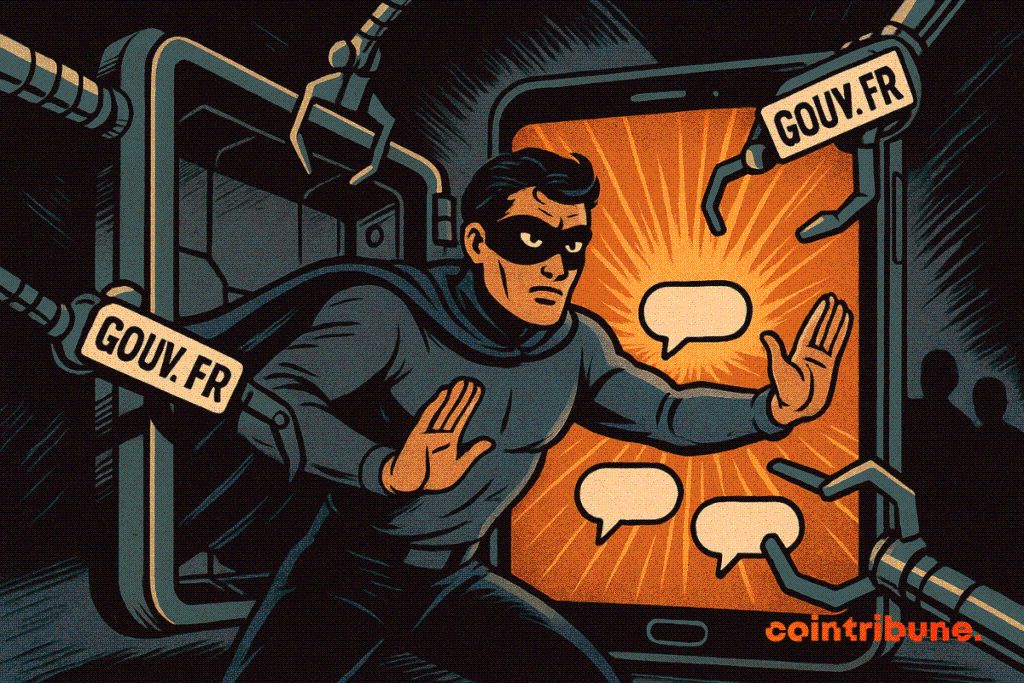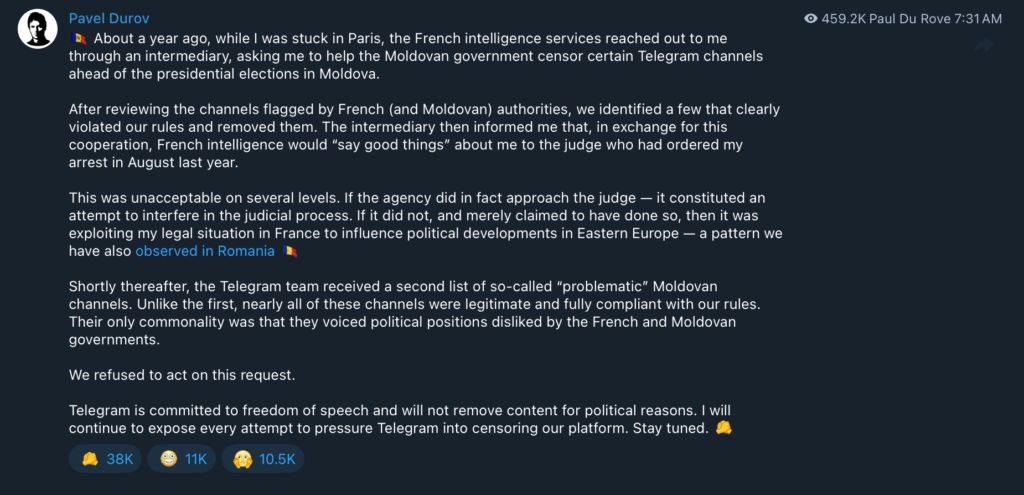France Allegedly Tried to Pressure Telegram Into Censoring Political Content
Pavel Durov breaks his silence and hits hard. The founder of Telegram claims that French intelligence services tried to force him to censor political content related to the Moldovan elections. A revelation that rekindles tensions between the messaging platform and French authorities. The case takes a worrying turn for freedom of expression in Europe.

In brief
- Pavel Durov accuses French intelligence services of having demanded the censorship of content related to the Moldovan elections.
- Telegram refused to delete legitimate political channels, despite promises of judicial ‘arrangements.’
- This case is part of a larger standoff between tech platforms and European governments over information control.
- Durov remains under judicial control in France since his arrest in August 2024, with no appeal date set.
Blackmail Disguised as Judicial Cooperation
Pavel Durov published some explosive revelations on Telegram Sunday. According to him, French intelligence services asked him to censor content related to the Moldovan elections, in exchange for “good things” promised to the judge overseeing his trial. For the founder of Telegram, this is nothing less than blackmail.
At first, the platform agreed to remove some posts that clearly violated its terms of use. Nothing unusual at this stage. But very quickly, French authorities came back with a second list of Moldovan channels to be removed. And here, the scenario changes completely.
 Source: Pavel Durov
Source: Pavel Durov
The only thing they had in common? They held political opinions that displeased the French and Moldovan governments. Faced with a request judged arbitrary and purely political, Telegram categorically refused.
This Moldovan case is not isolated. Last May, Durov had already denounced similar pressure regarding Romanian elections. Enough to outline a worrying pattern: that of a broader strategy of information control by some European states, at the expense of freedom of expression.
Telegram, Last Bastion of Freedom of Expression?
Since his arrest in Paris in August 2024, Pavel Durov has imposed himself as a leading figure in digital resistance. One year later, the French investigation is stagnant: no evidence has been found against him, but he remains under an obligation to appear in France every fourteen days. A judicial control which, according to his supporters, increasingly resembles administrative harassment.
The founder of Telegram does not mince words. “You can’t “defend democracy” by destroying democracy. You can’t “fight election interference” by interfering with elections,” he insists .
In his view, the pressures exerted to censor content amount to election interference far more serious than what authorities claim to fight against. This paradox, he points out, directly undermines France’s credibility on the international stage.
Faced with this situation, the crypto community and digital freedom defenders have largely rallied behind Durov. Telegram is no longer just an encrypted messaging app: the platform has become a symbol of resistance against authoritarian abuses in the digital age. A fight that far exceeds the person of its founder to touch the very foundations of freedom of expression in Europe.
The European context amplifies these concerns. In June 2025, a proposal from the European Union to monitor all communications, including encrypted messages, gained the support of nineteen member states.
Telegram, for its part, categorically refuses to open a backdoor or hand over its encryption keys. And Durov warns: rather than giving in, the platform will not hesitate to leave certain jurisdictions, France included.
A Battle Shaping Europe’s Digital Future
Pavel Durov’s warnings resonate with particular intensity. Last June, he stated that France “is rushing toward societal collapse” because of state censorship and what he considers the government’s ineffective policies.
Radical words, certainly, but ones that increasingly echo among many observers worried about the evolution of the political and digital climate.
The Digital Services Act (DSA), presented by Brussels as a tool against disinformation, appears to Durov as an existential threat.
Behind the stated user protection lies the establishment of centralized ideological control. The risk? To push Europe towards a two-speed Internet: on one side, content validated by states; on the other, marginalized dissenting voices.
The Telegram-France case highlights a deep fracture. On one side, tech platforms defending encryption and freedom of expression.
On the other, governments invoking public security to justify increasingly intrusive surveillance. Between these two poles, millions of users whose privacy becomes the subject of a political and geopolitical confrontation.
Faced with this pressure, Durov remains firm: Telegram will not bend . The platform publishes daily transparency reports on deleted content and collaborates with NGOs to respond to emergencies. However, it categorically refuses to become a political censorship tool serving states.
Disclaimer: The content of this article solely reflects the author's opinion and does not represent the platform in any capacity. This article is not intended to serve as a reference for making investment decisions.
You may also like
Bitget Spot Margin Announcement on Suspension of HIGH/USDT, GTC/USDT, SLP/USDT, PERP/USDT Margin Trading Services
CandyBomb x IR: Trade IR or BTC to share 1,104,000 IR
Bitget to delist the BABY On-chain Earn product
Earn Up to 25 USDT:Buy Crypto with Google Pay/Apple Pay!
